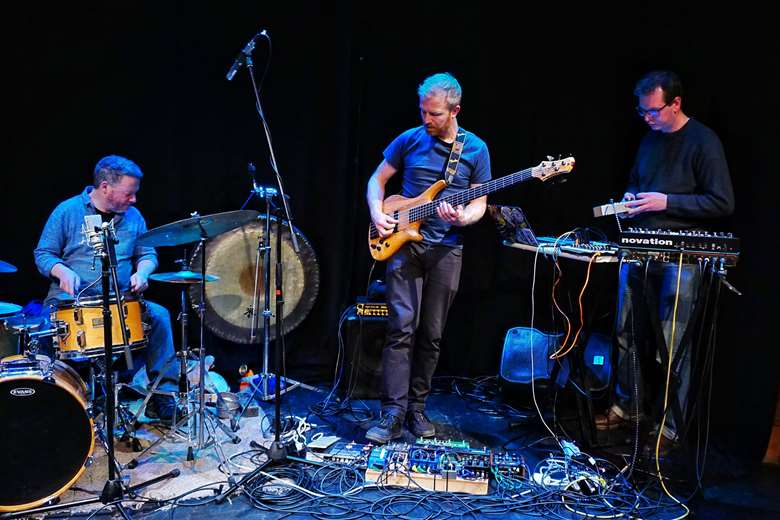CollapseUncollapse and Skylla fire-up Fizzle at Midland Arts Centre
Martin Longley
Wednesday, March 2, 2022
Martin Longley reports back on a stormy Birmingham night brim-full of weird and wonderful sounds

Fizzle means free improvisation. This Birmingham collective began as a regular backroom session in The Lamp Tavern, almost two decades ago, and now divides its programme between three main venues: the Polish-angled art gallery Centrala, the Eastside Jazz Club (within the Conservatoire) and Midland Arts Centre, a venue that’s presently celebrating its 60th anniversary. Since 2016, the Birmingham promoter Tony Dudley-Evans has been working very closely with Fizzle, utilising this spread of venues, and flinging programming ideas back and forth. Fizzle’s orientation embraces free jazz and electronics, as well as any improvisatory styles deemed suitable for exploration by its invited artists.
The intimate Hexagon Theatre at MAC is suited to closely-observed freeness, with its high-tiered circular seating plan. A pair of trios came together for a double bill, one male, the other female, their approaches differing, yet sonically compatible. CollapseUncollapse is a new formation of Mark Sanders (percussion), Andrew Woodhead (electronics) and Chris Mapp (electric bass). This latter pair smudge the role-line, as Woodhead uses two small keyboards to trigger some of his sonic content, and Mapp has a massive rug of effects pedals with which to enhance, stretch and contort his foundation string sounds. Sanders remains completely acoustic-organic, with his core drumkit, large gong to the side, and a suitcase full of metal bowls, wooden blocks and other small objects.
Much of their set revolved around fully-charged free abstraction, scrabbling, heightening, layering, climaxing, unclimaxing, but they also found spaces in which to lay out with ears cocked for tiny gestures. Sanders arranged his bowls, and then his wood, around the skins, coaxing and whispering. Mapp floated ethereally, and Woodhead turned dials on a small, rectangular metal box, built in Brooklyn, and called a Pocket Piano. Sensitivity was paramount throughout, whatever the volume and mass, the attack or the decay. The sounds generated by Woodhead and Mapp would sometimes inhabit close quarters, blooming out from their sources into a communal wraith-embrace. At the close, Woodhead began fingering speedy micro-runs on his Novation keys, in a jazzier way, as the Uncollapse section climaxed this filmic experience.
It was a stormy night, even in the Midlands, but Skylla eventually arrived for the second part of the evening. Ruth Goller has made a reputation as an electric bassist, from Acoustic Ladyland to Vula Viel, but her new Skylla band also finds her in a vocal role, flanked by fellow singers Alice Grant and Lauren Kinsella. The three wore intricate animal skull-horn headgear, shaped from cardboard, with a splay of feathers from each crown. There was indeed a pagan orgy aftermath aura to the vocal arrangements, as well as a sniff of Stockhausen’s “Stimmung”, along with elements discernible, perhaps, as being close to Scandinavian or Bulgarian styles.
Goller’s bass provided the spine, lightly articulated, softly chordal, and very far away from some of her fuller, heavier parts for other outfits. She frequently retuned, giving each piece a fresh canvas. Grant struck with one extrovert vocal outburst, but Kinsella mostly took the prominent position, operating around a wide range of impro-scat, soft ambiance and invocatory chatter. Goller actually stood a fair distance from her microphone, still sounding powerful, so perhaps without the ‘distraction’ of her bass, she would take a central vocal place. The Skylla album was improvised, it seems, but this live performance retained that same openness, with each band member highly attuned to the collective spread of sensitivity.
Ruth Goller’s Skylla album is already available, and CollapseUncollapse will soon release work via the Brooklyn label 577 Records…